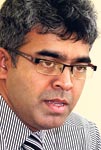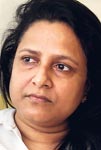Sixteen names, six places and six different years.
All this in just one page and there are 130 pages filled tightly with names, facts, places and lots of information.
This is just one subject and there are nine or more to agonize over.
No, this is not the thesis that a doctorate student is poring over, but the History textbook of a 12-year-old whose karma has been to be trapped, like 3.9 million other children in an education system which does not indicate what the purpose of such detailed study is.
The subjects include Mathematics, Science, History, Religion, First Language (either Sinhala or Tamil), Second Language (English), Link Language (Tamil or Sinhala), Geography, Life Competencies and Citizenship Education, Health & Physical Education, Practical & Technical Skills with some others such as Music, Dance, Art or English Literature thrown in as well.
 |
 |
 |
 |
| Dr. Nilupul Perera |
Dr. Ajith Amarasinghe |
Dr. Prasanna Gunasena |
Dr. Shiranthi Perera |
The unending load and lost childhood begin at the tender age of five-plus when smartly-clad in their uniforms and armed with brand new books they head to Grade 1 in the state education system. Innocent lambs to slaughter at the altar of so-called education.
Who says education, especially the Sri Lankan type, enlightens the human being? For these innocents who have no other recourse but our much-vaunted free education system, which in the past has produced greats matchable to any other from east or west, there is no enlightenment, only agony.
For many, with the curricula and syllabi overloaded in more recent times, the milestones become insurmountable. Before long, loom the spectre of the Grade 5 scholarship examination, then the make-or-break Ordinary Level (O/L) examination and finally the last-ditch battle of the Advanced Level (A/L).
The results speak volumes. Take last year’s O/L and A/L results. Of 310,441 children who sat the O/L, only 150,608 qualified with five or more subjects to go on to the A/L. This is a clear indication that more than 50% did not qualify. In 2009, meanwhile, of 177,640 who sat the A/L 108,725 had been eligible to gain admission to university.
If both groups of O/L and A/L students are put together totalling 488,081, nearly half, amounting to 228,748 children have got stranded somewhere in this education system in 2009 alone.
Seeing the pathetic plight of a large number of children who have come to them with all types of symptoms, at long last, a team of specialist doctors have not only studied and analyzed what has gone wrong with Sri Lanka’s education system and its severe impact on children but are also suggesting some solutions to pull this country from the brink of “educational terrorism”.
The team which has submitted its findings to the Parliamentary Consultative Committee of the Ministry of Education chaired by Minister Bandula Gunewardene, comprises Consultant Neurosurgeon Dr. Prasanna Gunasena, Consultant Neurologist Dr. Nilupul Perera, Consultant Physician Ananda Wijewickrema, Consultant Paediatricians Dr. Ajith Amarasinghe and Dr. Prasanna Liyanage and Consultant Ophthalmologist Dr. Shiranthi Perera.
Taking into account the paramount importance of the issue of education which has a bearing on the current and future wellbeing of this country and its people, the Sunday Times, starting today will publish a series of articles not only on the findings of these doctors but also an in-depth survey which has sought the views of the victims themselves, the children.
We also invite anyone, be it children, parents, teachers, principals, educationists, professionals etc to write in to us about the education system.
Take a day in the life of an average school-going child in Sri Lanka, says Neurosurgeon Dr. Gunasena. He will get up at dawn to pore over his books, have a quick meal, sometimes nothing, then head for school, bent-double under a bag filled to capacity with fat books. He will sit through lesson after lesson, where teachers, who have to meet impossible targets are working against much odds to drill into tiny brains fact-filled lessons.
After a full day of classes, he will have a scrap lunch and head for a congested tuition class, once more to be faced with an onslaught of information, finally making his weary way home only late in the evening. A rushed dinner and with his parents screaming at him to do his homework or look through the day’s work, he will literally burn the midnight oil, into the wee hours of the morning, laying down his bursting head for a few hours of sleep, to begin another strenuous day, says Dr. Gunasena.
The weekends are no better, he stresses, while Paediatrician Dr. Amarasinghe points out the repercussions of such strenuous routines and performance expectations on children.
Look at the suicide reports in the newspapers due to educational reasons, says Dr. Amarasinghe, explaining that there seems to be an alarming rise in the numbers.
Children are also constantly falling ill, says Neurologist Dr. Nilupul Perera, coming to us with various symptoms such as tension headaches, migraines, aches and pains, lethargy. “These symptoms get aggravated closer to examinations. When we talk to them, no medication is needed. They leave with the assurance that examinations are not life and death issues,” he says.
Citing an example of how children are unable to absorb this information overload, Ophthalmologist Dr. Shiranthi Perera speaks of a child who had been taught in detail not only in class but also at home about Marco Polo (the famous explorer from Venice who travelled extensively in Asia) for the second term test last July. First given a detailed explanation and then made to study important dates and places and even draw detailed maps of where Marco Polo went, the mother was confident that her little girl was an expert on this traveller.
She had, to the satisfaction and relief of her parents and History teacher, scored well but recently when the mother mentioned Marco Polo to her two months after such intense study, the little one had looked blankly and asked, “Who is that?”
Is this memory loss in a child or should we seriously ponder whither school education is heading in Sri Lanka?
Otherwise, our children will continue to be caught in a snare that is education, is the view of this eminent panel of doctors.
(Please send your views to ‘School Education’, The Sunday Times, 8, Hunupitiya Cross Road, Colombo 2 or e-mail to:
schooledu@sundaytimes.wnl.lk) |






